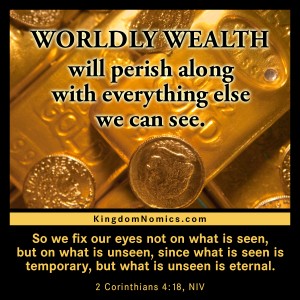Are you among the few who make the greatest difference for Christ within your sphere of influence?
Many people choose what is easy. Few people champion the kind of principles we’re discussing with KingdomNomics. Fewer still are those who will live them out. Being intentional about the use of our time, talent, and treasure is difficult. So we may not be surrounded by a great crowd of enthusiastic adherents to these ideas. But they are still true. They actually work in this life, bringing great joy and contentment.
In most churches, it’s probably true that 80% of the giving and 80% of the hands on ministry is done by only 20% of the people.
The real question is this: “Am I going to aspire to be one of the few strategic Christians in this world who lives out the incredible truths of KingdomNomics, rather than simply talking about them … or will I take the easy way that leads to unprofitable results?”
Will you look back from the vantage point of eternity and know you’ve made the right choices?
It’s true that KingdomNomics principles have incredible benefits here and now—but they also require discipline, wisdom, and sacrifice. We live in an instant gratification world in which people want easy fixes and simple solutions.

But our focus is not on today’s easy pleasure; it’s on eternal significance. Our ultimate joy is deferred to that “someday” life. Each of us must choose what matters most.
Every day I see people living out the well-known parable of Jesus, in which various people are entrusted with certain sums of money (see Matthew 25:14-30). Some people simply hide their resources. Some consume every dollar they have, as well as dollars they don’t have (leading them into debt). Others invest a little, yet still consume more than necessary. But others earn incredible dividends by investing wisely and sacrificially. From a purely financial perspective, disciplined investment is wise. However, from a kingdom perspective, the implications are exponentially profound. It is the path of the narrow road.
KingdomNomics dictates that my checkbook speaks of a life consumed by eternal realities.
Paul said of kingdom-based people that “we fix our eyes not on what is seen, but on what is unseen, since what is seen is temporary, but what is unseen is eternal” (2 Corinthians 4:18). The idea is so simple, yet so challenging.
I have to ask myself from time to time, “Does my check book truly reflect that I have my eyes fixed on the unseen and eternal things that are important to God?” That’s the leading indicator of my heart and soul. It demonstrates what matters to me, regardless of what I say matters. I know that KingdomNomics dictates that my checkbook speaks of a life consumed by eternal realities. Kingdom-based individuals will have very different priorities from most people. Unless we keep our eyes focused on God, we will tend to drift back toward the ways of the multitude.
Do you see yourself as God’s steward for the strategic use of resources, regardless how great or small?
(KINGDOMNOMICS)





